Klapkova E, Kukacka J, Kotaska K, Suchanska I, Urinovska R, Prusa R. Clin Lab. 2011 57(7–8):599–606. IF: 0.827

Department of Clinical Biochemistry
Abstract
BACKGROUND: A modified high performance liquid chromatographic (HPLC) method has been developed for the simultaneous determination of methotrexate (MTX) and its main metabolite 7-hydroxymethotrexate (7-OHMTX) and compared to the immunochemical fluorescence polarization immunoassay (FPIA2) determination of methotrexate. METHODS: Methotrexate was determined by HPLC with UV detection at 303 nm after precipitation of proteins with trichloroacetic acid. Fluorescence polarization immunoassays (FPIA2) of methotrexate were performed on the TDx FLx Immunoassay Analyzer. RESULTS: Our data indicate good correlation between methotrexate levels > 1 μmol/L determined by HPLC and FPIA2. (r = 0.94, Spearman correlation coefficient). However, concentrations of methotrexate < 1 μmol/L measured by fluorescence polarization immunoassay were overestimated. CONCLUSIONS: The concentration of MTX < 1 μmol/L are overestimated due to the cross reactivity with metabolites 7-OHMTX and 2,4-diamino-N10-methylpteroic acid (DAMPA). The cross reaction may affect the therapy and lead to relapse in children with acute lymphoblastic leukemia.
-mk-
